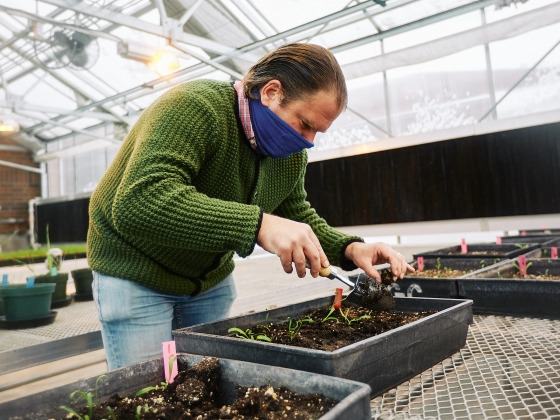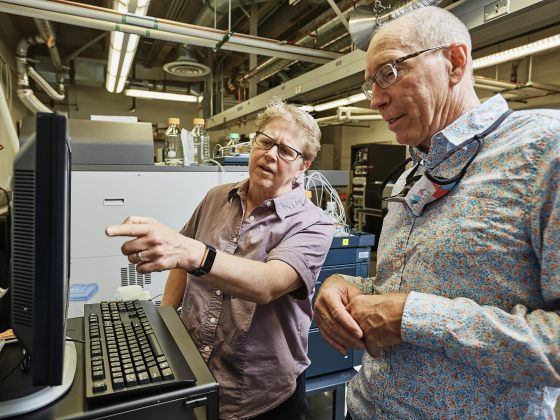Research, Creativity and Scholarship 2020-2021

MSU College of Education, Health and Human Development’s Three Minute Thesis competition to be held April 28
MSU's College of Education, Health and Human Development will host its first-ever Three Minute Thesis event at 4 p.m. Wednesday, April 28. The event will be held entirely online, and a livestream will be available for public viewing. The link to the livestream will be available at montana.edu/ehhd/threeminutethesis.html.
The 13 finalists chosen for the college’s Three Minute Thesis competition come from disciplines across the College of Education, Health and Human Development. They will explain, very concisely, how their research affects the average person. Contestants condense their research into a brief, engaging presentation for a non-specialist audience, using only a single presentation slide as a visual aid.
“Graduate student research is very important to the College of Education, Health and Human Development and covers a wide variety of high impact areas of focus relating to MSU’s strategic plan intentional focus area of improving lives and society,” said Mary Miles, associate dean in the College of Education Health and Human Development and one of the event’s organizers. “The graduate student research selected for our inaugural Three Minute Thesis competition showcases how we work to improve lives and society through research in education, community health, sustainable food systems, kinesiology, nutrition, psychology and more.

Montana State professor, collaborators receive nearly $1 million for Crow water project
Vanessa Simonds, associate professor in the Department of Health and Human Development, received the $999,417 grant from the National Science Foundation through its Advancing Informal STEM Learning program. Simonds and her collaborators will use the funds to create and implement a summer program for Apsáalooke, or Crow, youth in the fifth and sixth grades, as well as a mentorship program for Indigenous high school students and tribal college students.
Simonds’ collaborators include Little Big Horn College, Crow Agency Public School, Crow Environmental Health Steering Committee and the advisory board of Guardians of the Living Water, a summer camp and after-school program at Crow.
“I’m grateful for this funding and excited to work with youth,” said Simonds, who is an enrolled member of the Crow tribe. “And working with youth is a way to reach families.”

MSU receives nearly $300,000 from EPA for study to help divert food waste from landfills
Montana State University has received nearly $300,000 from the U.S. Environmental Protection Agency for a study that aims to help reduce food waste and divert it from landfills.
With the funds, MSU researchers will partner with the city of Bozeman to study household food waste and explore the potential to use anaerobic digestion for processing household food waste in the city, applying a decentralized approach to organic waste management. Anaerobic digestion is a process through which microorganisms break down organic materials, such as food scraps, without oxygen. The process produces biogas, which can be captured and used for energy production, and digestate, a nutrient-rich fertilizer.
Roland Ebel, the grant’s project director and a postdoctoral research associate in MSU’s sustainable food and bioenergy systems program, said the process involves putting accumulated food scraps in a prepared, airtight container. Specific bacteria, called inoculants, then transform the scraps into a nutrient-dense biofertilizer over a period of about four to six weeks.

Survey conducted during COVID-19 pandemic shows food security has decreased among Montanans
A statewide survey conducted by Montana State University researchers during the COVID-19 pandemic determined that food security — or having consistent access to enough food for an active, healthy life — has decreased substantially among Montanans. At the same time, anxiety and other feelings of mental distress are on the rise.
“This survey was the first of its kind in Montana to report about the immediate impacts of COVID-19 on food security,” said lead researcher Carmen Byker Shanks, a CAIRHE investigator and associate professor in MSU’s Department of Health and Human Development. “In addition, we investigated a variety of health variables, since the causes and consequences of food insecurity are multifaceted. To build solutions to food insecurity in our state, we must understand the entire scope of the issue.”

MSU college awards funds to help advance diversity, equity and inclusion efforts
Montana State University’s College of Education, Health and Human Development has awarded grants to nine projects that help advance the college’s diversity, equity and inclusion efforts.
“We are elated to be able to offer these grants this year,” said Kayte Kaminski, assistant dean in the College of Education, Health and Human Development. “As diversity and inclusion efforts are part of our broader MSU strategic plan, we thought of this as an opportunity to further our contributions to not only the broader MSU strategic plan but to also move forward our college’s own Diversity and Inclusion Plan.”
This is the first round of funding of this sort from the college, with award amounts ranging from $2,360 to $5,000. The college hopes that the nine projects will result in future programming, professional development and other opportunities impacting a wide range of people, Kaminski said.

MSU researchers receive $294,000 grant to research bile acids
New research at Montana State University will examine if foods that are rich in fiber, such as lentils, can help lower unhealthy bile acid levels in the body, which are associated with a range of obesity-related diseases afflicting approximately one-third of U.S. adults.
The research by Mary Miles in MSU’s Department of Health and Human Development is supported by a $294,000, three-year grant from the U.S. Department of Agriculture’s National Institute of Food and Agriculture, or NIFA. MSU chemistry and biochemistry professor Brian Bothner, who is also scientific director of the Proteomics, Metabolomics and Mass Spectrometry Facility and director of Montana INBRE, is co-principal investigator on the project.
The research, “Therapeutic Impacts of Dietary Pulses on Bile Acids,” is one of 29 projects that collectively received a total of more than $8.5 million in funding from NIFA. The research and Extension grants are part of NIFA’s Agriculture and Food Research Initiative and are intended to advance solutions to critically important problems in U.S. agriculture.
